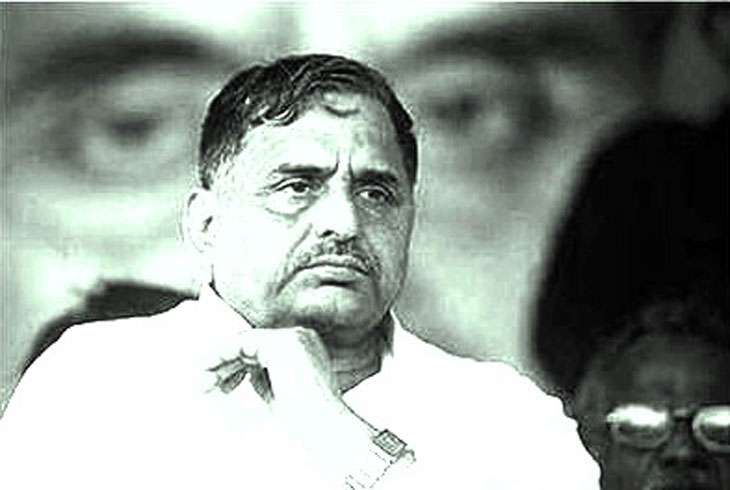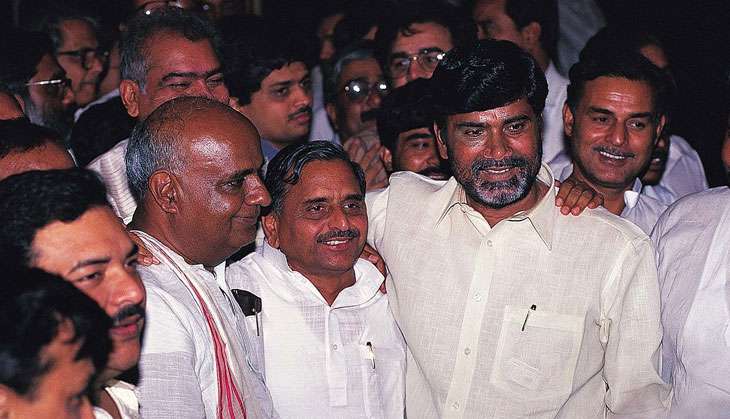Lesson for Mulayam Singh: you reap what you sow

Lucknow, the city of Nawabs, has been the centre of a hot power struggle this winter.
In fact, the ongoing feud in Mulayam Singh Yadav's family is reminiscent of political upheavals in the 18th century era of the Nawabs, and even before that, the intrigues of Aurangzeb's court. Even NT Rama Rao fell from glory in a similar manner in Andhra Pradesh during the 1990s.
Dethroning a giant
On 1 January 2017, while most of the world was focussed on welcoming the new year, Akhilesh Yadav toppled his father from his post as the Samajwadi Party's national president.
It was a big moment in Uttar Pradesh's political history as Mulayam single-handedly steered his party to power from scratch to become the undisputed czar after a six-decade struggle in the political arena.
Also read - Palace coup: Akhilesh dethrones father Mulayam, cuts uncle Shivpal down to size
Mulayam started his political journey from a humble background and couldn't even speak fluent Hindi at the beginning of his career - an attribute considered necessary for any politician to gain acceptance in the Hindi heartland.
Yet, he not only formed his own party, but also managed to turn it into one of the principal forces in India's politically most important state.
However, can Mulayam's political journey be assessed solely on the basis of his success? Could one sympathise with his current predicament?
Considered one of the country's top politicians, his style of politics has always befuddled pundits. On one hand, he is a man who appears to be caught in a cobweb woven by the ambitions of his family members.
On the other, he's a man who has consistently managed to intrigue the entire political class through years of sly manoeuvring.
The first chapter

Politics was hardly a conducive playground for a stumpy wrestler from a small town who belonged to a backward caste and could hardly communicate in Hindi, let alone match his more illustrious, English-speaking contemporaries.
When Mulayam first ventured into the political domain, socialists and the Congress dominated it. Considering these circumstances, his political rise is nothing short of phenomenal.
A political stalwart like Chaudhary Charan Singh would fondly refer to him as "Chhote kad ka bada neta (A tall leader of short height)."
This "tall leader of short height" went on to claim Charan Singh's legacy. In fact, he was instrumental in pushing Charan Singh's son Ajit Singh to the fringes.
The hallmarks of Mulayam's politics over the years have been cleverness, unabashed opportunism, gumption to stand by his loyalists, a weakness for family and a thick skin.
It is said that Mulayam could recall at least 50 workers by their names at any political event during the old days.
The leader's personality was shaped in the akharas of the rustic village of Safai in Uttar Pradesh, where he not only learnt the tricks of wrestling, but also imbibed the early lessons of politics.
The first chapter of Mulayam's politics dates back to the 1960s, when anti-Congressism was reaching its peak. Since then, he has been a five-time MP, held the Chief Minister's post three times, and even served as the country's Defence Minister.
A coalition of socialists and the Jana Sangh had formed the government in UP after the Emergency ended in 1977. Mulayam served as the state's co-operative minister in that dispensation. It was when he came in contact with Janeshwar Mishra, famously known as 'Chhote Lohia (Lohia junior)'.
The coalition government was short-lived, but Mulayam had already learnt the tricks of the trade and he quickly deserted Raj Narain, the tallest socialist leader in UP at that time, and joined hands with Chaudhary Charan Singh.
Politics of convenience
Mulayam's camaraderie with Chaudhary Charan Singh was not inspired by any ideology. Charan Singh was essentially a Jat leader belonging to a family of landlords.
At the time, Mulayam would argue that political compromises were necessary to keep Lohia's organisation floating. This reasoning proved to be a part of Mulayam's opportunist inclinations. This was evident when the likes of Anil Ambani, Amitabh Bachchan and Jaya Bachchan were baptised by Mulayam as socialists during the last decade.
Mulayam began tweaking the notion of socialism as per his convenience from the early 1980s. It was an eventful decade in political terms that saw the rise of V P Singh as a prominent national leader. Singh epitomised the fight against corruption by taking on the powerful Gandhi family in the Bofors scandal.
Mulayam made the most of this opportunity by joining Janata Dal, spearheaded by VP Singh. Janata Dal was largely a conglomerate of socialists and disgruntled Congressmen at that time. It was supported both by leftist and rightist forces oust Congress from power.
Mulayam's political dexterity only improved during this period of political uncertainty caused by the Ram Mandir agitation and mass protests against the Mandal Commission recommendations. In 1989, VP Singh made history by becoming the Prime Minister, while Mulayam was elected as the Chief Minister of Uttar Pradesh.
The VP Singh government only survived for 11 months, as the BJP withdrew its support. Mulayam made yet another somersault at this juncture and extended his support to Chandrashekhar's Samajwadi Janata Party. He also managed to garner much-needed support from the Congress to stay in power.
An incident for the ages
Nothing demonstrates Mulayam's personality better than one incident that occurred during the formation of the UP government in 1989.
Charan Singh's son Ajit Singh was posing a serious challenge to Mulayam Singh in the race for state's top job. While Mulayam was considered a mass leader, Ajit Singh had just returned from abroad after completing his education and his father's name was major factor which worked in his favour. Even VP Singh wanted to see him as the next CM of Uttar Pradesh.
But Mulayam had other intentions. VP Singh sent former Gujarat Chief Minister and socialist leader Chiman Bhai Patel to Lucknow to finalise the name of the chief ministerial candidate. Patel was also in charge of Janata Dal's UP unit during that time, and sources claimed VP Singh had clearly instructed Patel to approve Ajit Singh's name.
However, Mulayam managed to meet Patel as soon as he landed in Lucknow. Patel went back to Delhi without even meeting Ajit Singh.
What transpired during the meeting remains a mystery to this date, but Patel announced Mulayam as the CM candidate soon after his return to the national capital.
Mulayam had probably not forgotten VP Singh's preference and he responded in kind only 11 months later by pulling the rug from under Singh's feet.
A political acrobat

Many of Mulayam's actions stand in contrast with the preachings of his political guru and ideologue, Ram Manohar Lohia. While Lohia was known as an unflattering, straightforward leader, Mulayam remains unpredictable even today.
Lohia advocated the principle of "one man, one wife". Mulayam remained silent on this issue, reportedly to cater to his Muslim vote bank. He lost no opportunity to encash the idea of secularism while restricting Lohia's socialism to the upliftment of his own Yadav caste.
Lohia's legacy and the fallout of the Mandal agitation helped him further in projecting the image of a leader representing the backward segments of Uttar Pradesh. His bold decision to order firing on karsevaks at the height of the Ram Temple movement also made him the 'saviour' of Muslims. For years, it was this Yadav-Muslim combination that worked wonders for him.
But then, the Congress withdrew its support to the Centre, resulting in the fall of Chandrashekhar's government in 1991. Mulayam also lost power in UP at the same time.
But, Mulayam was up for yet another political somersault. In 1992, he parted ways with the Samajwadi Janata Party to launch his own party.
It was perhaps the biggest political gamble of his life.
Many insiders claim Chandrashekhar was deeply aggrieved at this decision.
Regardless, Mulayam was determined to make his own way. He now possessed a party of his own, a sizeable cadre and a most importantly, a core vote bank.
He soon succeeded in becoming the Chief Minister again with the support of Mayawati's BSP. The alliance between the two parties was an unnatural one. Soon, the relationship between the two parties soured and the bad blood exists even today.
The 'almost' Prime Minister
One of the most crucial years for Mulayam's political career was 1996 when he almost became country's Prime Minister after playing a pivotal role in the formation of the United Front government with the support of the Left parties.
Mulayam was the frontrunner among the likely Prime Ministerial candidates of this government. However, Lalu Yadav, the man from his own caste, scuttled his attempts to grab country's most powerful office.
Mulayam then spent the next three years in the North Block, and as Opposition leader. In 1999, the 13-month-old Vajpayee government lost power on the floor of the house. Sonia Gandhi went to Rashtrapati Bhavan armed with the letters of support from all the major Opposition leaders, including that of Mulayam.
But Mulayam flip-flopped yet again. At the same time when Sonia Gandhi was claiming his support in front of the then President KR Narayanan, Mulayam was addressing the media, announcing that he would not support the Congress bid to form the government.
Politics of opportunism
Mulayam's politics of opportunism is often contradictory. For instance, he formed the government with the support of the Left parties in 1989 and 1996. Yet, these ties did not prevent him from saving UPA's government in 2008 over the Indo-US nuke deal. Not only that, he even presented the UPA government's report card to the public, despite the fact that he was not a part of it.
His politics have not even shied from deserting his core vote bank at times. In 2009, he welcomed Kalyan Singh to his party. This proved to be a costly move as the Samajwadi Party was reduced from 39 seats to 22 seats in the next general elections. None of its Muslim candidates managed to win.
Mulayam is still accused of hobnobbing with the BJP from time-to-time. It is another matter that he never lets these rumours spread. He has never repeated the mistake he committed by accepting Kalyan Singh into his party fold. Although, the cosy relationship he enjoyed with Atal Bihari Vajpayee is no secret in the corridors of power. It was only BJP's tacit support that enabled him to form the government in 2003.
Mulayam even stumped West Bengal Chief Minister Mamata Banerjee during the last Presidential elections. He changed his decision to support Mamata's candidate several times in a span of just two days.
The Samajwadi Party participated in a nationwide bandh organised by Opposition parties against FDI in the retail sector during UPA-II. At the same time, Mulayam openly declared that the Manmohan Singh government was under no threat.
Mulayam's health is failing him and his power of memory is declining - if a senior Lucknow-based journalist is to be believed.
But he didn't build his empire in a day. The ongoing power tussle in his family is just another bout of turbulence in his political journey, the only difference being that he seems to be on the losing side this time.
As the common saying goes, a father should not mind defeat at the hands of his son. But Mulayam has not shown enough heart to take recent events in the same spirit.
Edited by Aleesha Matharu
More in Catch - Ring out the old, ring in the new: Mulayam is going, it is advantage Akhilesh
What truce? Akhilesh plays his move, keeps the emergency national executive meet on for tomorrow
First published: 2 January 2017, 11:51 IST






![BJP's Kapil Mishra recreates Shankar Mahadevan’s ‘Breathless’ song to highlight Delhi pollution [WATCH] BJP's Kapil Mishra recreates Shankar Mahadevan’s ‘Breathless’ song to highlight Delhi pollution [WATCH]](https://images.catchnews.com/upload/2022/11/03/kapil-mishra_240884_300x172.png)

![Anupam Kher shares pictures of his toned body on 67th birthday [MUST SEE] Anupam Kher shares pictures of his toned body on 67th birthday [MUST SEE]](https://images.catchnews.com/upload/2022/03/07/Anupam_kher_231145_300x172.jpg)






